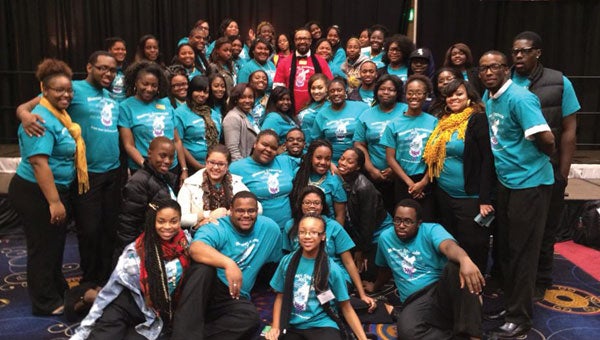Choir trip South adds Civil Rights focus this year

The United Voices of Western Inspirational Singers will perform in Andalusia tonight and Sunday. They are directed by Dr. Alphonso Simpson Jr., an Andalusia native.
Andalusia native Dr. Alphonso Simpson, Jr. has taken an annual college choir trip and made it a civil rights lesson of sorts.
Simpson, who is a full professor of African American Studies at Western Illinois University, is also an accomplished musician. Last year, he brought the United Voices of Western Inspirational Singers (U.V.O.W.I.S.) to Andalusia for a concert and a break from cold weather.
But the weather wasn’t the only warmth the group found here.
“It was a beautiful experience,” Simpson said. “A lot of students of really good professors hear of where they’re from, and of their travels all over the world. They hear Miami, Los Angeles, a state or a city. If I talk about Andalusia, Ala., now they KNOW what is.”
It is sweet tea and warm hospitality and food they’ve never experienced before. And they couldn’t wait to come back, Simpson said.
“They kept saying, ‘we gotta go back, and we want to spend an extra day. They talk about the hospitality, and about kind, loving and warm people. As well as the nice, warm, weather.
Each member of the 55-member Voices paid something to participate in the trip. Churches and professors in Illinois contributed, as did churches in Andalusia. This year, the students wanted to stay longer.
They arrived by bus yesterday, and were greeted with dinner at the church.
Today, Fri., Feb. 28, they will have a sound check at LBW at noon, have lunch at 2, then have a performance at 6:30 tonight in the Dixon Center.
The 2 o’clock lunch is at Amazing Grace Café in Dozier.
“They did lunch for us last year,” Simpson said. “They raved and raved again. This is one of the café’s busiest days. We appreciate them taking their time out for lunch.”
After the Friday night concert, supper will be at the church again.
“Then, we’re back to First Baptist Church Whatley Street, and they’ll feed us again,” Simpson said. “I’m used to it. But my students are like, ‘Oh, my God. We’ve never had food that’s been so good.’ ”
The extra day in this trip is being used for an additional performance, as well as an opportunity to learn more about the fight for civil rights. On Saturday, the group will go to Montgomery where they will tour the campus of Alabama State University. They also will visit Dexter Avenue Baptist Church, where civil rights leader Martin Luther King was once the pastor, visit the MLK parsonage, and tour the Rosa Parks Museum.
Simpson said that visiting the sights will make the events of the Civil Rights Movement more real to his students, for whom many of the struggles that occurred 50 years ago seem unreal.
On Saturday night, the group will perform at First Baptist Church Greater Washington Park.
“We’re not doing the same concert,” Simpson explained. “We’ve been back in for school six weeks, and we’ve put together about 20 songs. The songs we are going to do in Andalusia are different from than ones in Montgomery.”
Dr. Eric Brooks, who chairs the Department of African American Studies at WIU, also is a native Alabamian. This year, he joined the trip, and his parents will host the group for lunch in Montgomery.
Saturday night, the group will return to Andalusia and will be a part of Sunday morning worship services at First Baptist Church Whatley Street, beginning at 10:30 a.m. After another lunch at the church, students will board the bus and be back on the road.
But not without pit stops, Simpson is sure. Last year, they loved shopping at Pic-N-Sav, and wanted to take home a number of items that aren’t available in Illinois – specificially Golden Flakes chips, pork cracklin’s, Dixie Lily grits, and Snowden sausage.
Simpson said that while finishing his PhD in Wyoming, he lived in a city that boasted it was “like no place on earth.”
“In my experience, I think that Andalusia, Ala., is like no place on earth,” he said. “It’s really, really very fascinating.
“You don’t appreciate it until you leave it,” he said. “I use the analogy with my students, it’s like asking a fish to talk about water, or a bird, the air.
“Living in Andalusia, this was normal, so I couldn’t appreciate it,” he said. “I left it, and was gone for decade or so. Now I know there’s no place like it. My students go home, but they don’t come home like I come home. I am more proud than anything to be here, have my wife and children with me, but we are also bringing all of these students – 55 of them – to experience what we lived in.”

